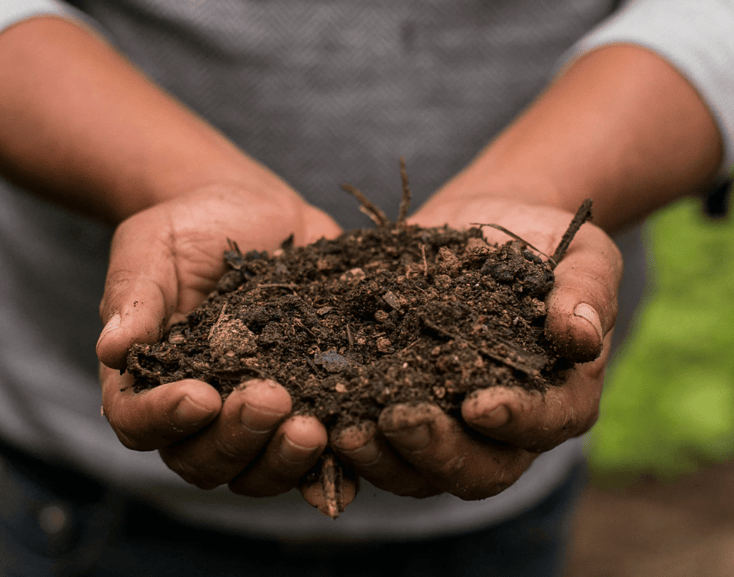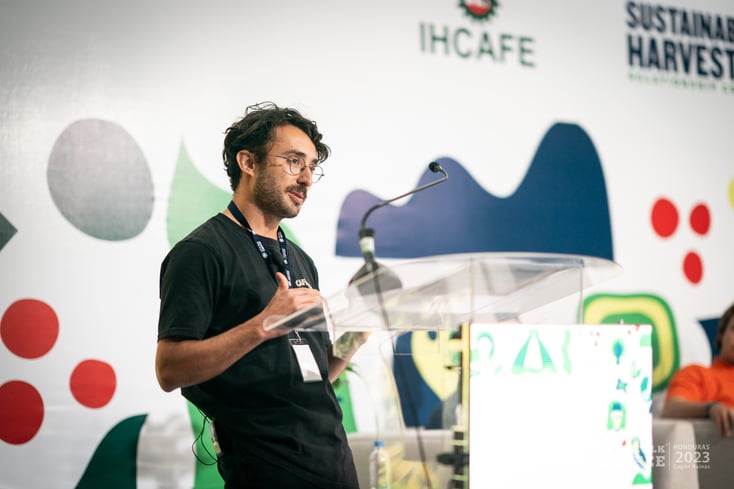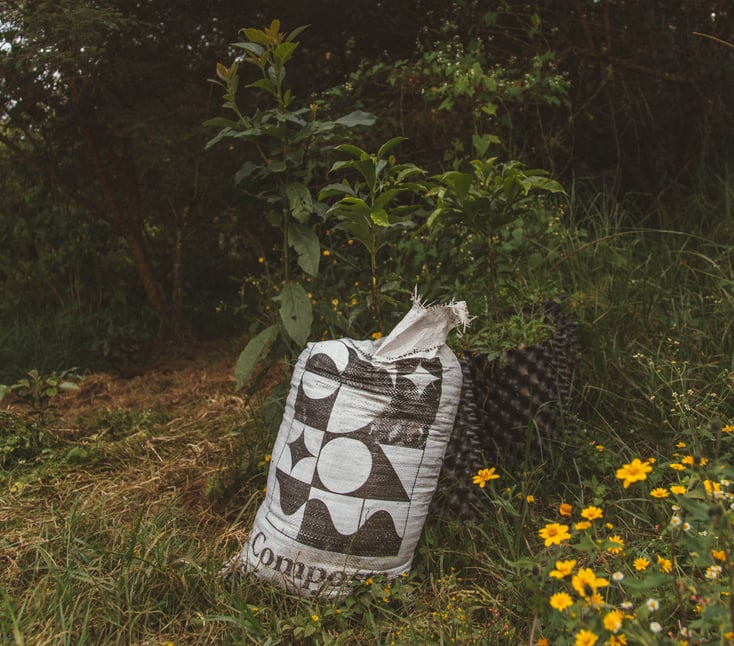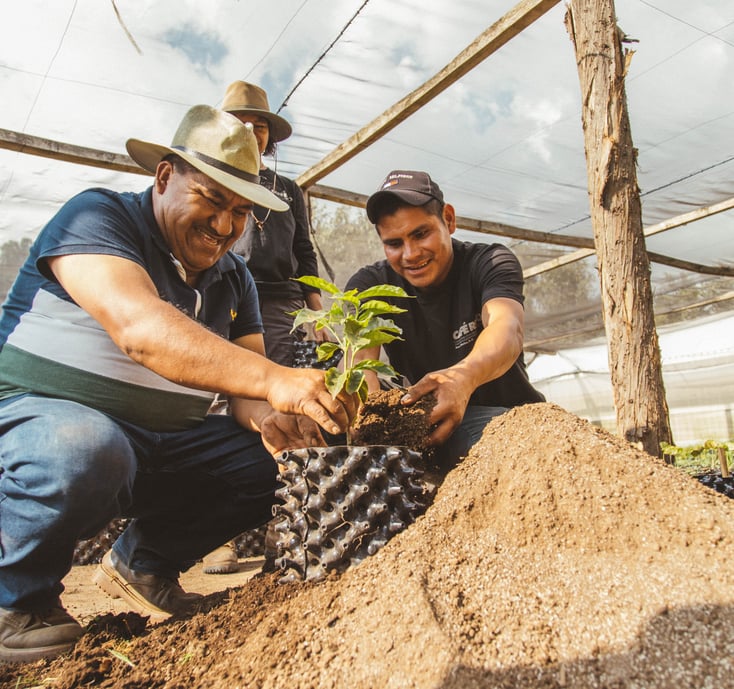
We had the pleasure of hearing from Lalo Perez, a co-founder of BUNA Mexico, a coffee brand with multiple cafes in Mexico City, a roastery, and an impressive sustainability program, during a panel discussion called "Are Biological Solutions the Future of Coffee Agriculture?" at Let's Talk Coffee in Copán, Honduras in early 2023. Following up on this conversation, we interviewed Lalo to learn more about biological agriculture, and we're excited to share his insights with you!
________________________________________________
Lalo, thank you so much for joining us! After your panel at Let's Talk Coffee, we were eager to dive deeper into the topic you discussed. So, starting with the basics, how do you define biologically active soil, and what does that mean?
There is confusion when discussing living or biological soils and referring to them as if some soils are dead and others are alive. The reality is that the entire planet is covered in life. There are more microorganisms in 1 gram of soil than stars in the cosmos, so all soils in the world are entirely alive. When we talk about managing biology in the soil, it means trying to promote a biological ecosystem that helps us get the results we want. That's the simplest way to explain the type of agriculture we aim to promote.
In your presentation at Let's Talk Coffee, you mentioned that the soil is like a database that helps us understand the health and productivity of our agriculture, particularly in the case of coffee. Please tell us more about that database and what you mean by it.
Indeed, if you think about DNA, it's essentially data. It's the same with soil. Much communication is happening through phytohormones, sap, and chemical information exchanges. So, all that data encoded in the soil is a bit like the raining code in the movie "The Matrix," we're still trying to figure out how to read it. But that's how an ecosystem functions, with extensive information exchange.
Instead of merely interpreting the information using our rational thinking, I encourage the producers we work with to observe and surrender to the natural processes the ecosystem wants to carry out because the ecosystem has strong impulses. Trying to control it, in my opinion, is of little use. So, when we refer to the database in the soil, we mean the accumulation of information resulting from the communication among all the biology in the soil. We encourage a way of observing the soil that generates resonance of patterns, so we can understand what patterns emerge when different observations are present.

Can you tell us what effects the lack of a biological system in the soil has, particularly its impact on coffee productivity, which is our main product but applies to any agricultural product?
As farmers, we believe that productive soil requires a balanced biological ecosystem. The lack of this balance is called dysbiosis, meaning the ecosystem is not functional. We aim to promote this biological balance to increase productivity. However, when the balance is lacking, plants become independent and need external assistance. This assistance is referred to as agricultural inputs. Adding nutrients is the traditional model for increasing productivity, but nutrients are abundant on the planet.
Instead of adding nutrients, we focus on channeling the biological ecosystem to fix nitrogen in the soil, making it available for plants. This ecosystem facilitates the mobility of nutrients. When it's lacking, plants need us to feed them instead of being able to feed themselves.
How would you explain that fertile soil doesn't necessarily result from organic fertilization?
I love the term we use in agriculture: fertility. It means the ability to procreate, and it's incredibly powerful. It refers to the soil's capacity to reproduce. I make a clear distinction between fertilization and fertility. We strive to manage ecosystems to maintain continuous fertility, which is very different from fertilizing.
So, the paradigm of fertilization in agronomy is all about conducting thorough analyses, estimating the nutrients the crop needs, sourcing them, and applying them as efficiently as possible. However, our approach is to avoid fertilization. Again, considering that nutrients are abundant, we focus on mobilizing them for the plants. We believe that all soils have the capacity for fertility because it's true; all soils contain minerals and are surrounded by a nitrogenous atmosphere.
We often talk about soils as if some are fertile and others are not, but the truth is that all soils have fertility potential. The challenge lies in managing the ecosystem, and that's the beauty of human intervention. I want to make a quick parenthesis here: we tend to think that humans do more harm than good, but thanks to human intervention, we can manage ecosystems better than leaving them unattended. The opposite is also true; we can mismanage an ecosystem. So, human intervention is not inherently wrong, and we can intervene to create fertility.

How can soil care systems help farmers balance productivity and cost reduction?
Much of the productivity increase comes from improved management, like how and when to apply inputs and how to use irrigation more efficiently. Economic pressures push us to be efficient. This is a beautiful aspect of economics; it forces us to be efficient.
There are people in the world producing coffee so efficiently that selling it at market price remains profitable. Coffee producers might not want to hear this, but it's true. The challenge is that our economic system relies heavily on financial and input systems. Addressing how we achieve the same productive efficiency with biological systems is complex and simple. It's simple because the potential productivity of a well-managed crop is likely greater when associated with biology rather than a chemical system.
This fact is evident in various cases. For instance, with sugarcane, the potential productivity is around 300 tons per hectare, but even with the best chemical systems, the average yield is 100-110 tons per hectare, with some reaching 180 tons. However, we're still far from reaching the plant's genetic potential because that potential can only be expressed when associated with a biological community. Reaching a crop's genetic productivity potential with a biological system is much easier. The challenge lies in the management required to create that biological ecosystem.
Achieving this can be challenging as it depends on factors such as the crop, context, location, and market. The unique approach needed for each situation makes it difficult to provide a general prescription. Agriculture is highly localized, which further adds to the complexity.
Do you generally recommend anything to those curious or eager to do things differently?
Yes, we always begin our discussions by emphasizing that the most crucial factor in agriculture is economics. Agriculture is, by definition, an economic activity. So first, understand the market where you live, comprehend the productive context, and then determine the productivity expectations because it varies worldwide.
Next, before making recommendations on what to improve, we first focus on detoxification. It's like taking probiotics; we all know what probiotics are, but taking antibiotics alongside them contradicts their purpose. This is one reason many biological techniques haven't delivered the desired results for farmers. Biological agriculture is not a product; it's a system. So, to prepare the soil for a biological system, we need to identify the challenges and understand how we can address the use of antibiotics, herbicides, pesticides, and insecticides and find ways to eliminate their toxicity. Then, and only then, can we start building a biological ecosystem that generates productivity. It's not expensive; the real challenge is changing our perspective on agriculture.

Do you have any success stories you can share with us?
My favorite one is a bit abstract, but I like it. We conducted a test comparing a coffee monoculture, a natural forest without human intervention, and a biologically managed agroforestry coffee plantation using our own designed model. After a year, at the end of one cycle, we measured the biology of the soil in the biological ecosystem and found that the biologically managed coffee plantation had more soil biology than the natural forest and at least twice as much as the conventional monoculture. This is relevant because the higher the biological concentration, the more functions it performs, the better it can recycle nutrients and, consequently, the higher the productivity.
Now, in terms of consumers, what would you recommend or ask from consumers who might be thinking of supporting more products produced in this way?
My coffee company in Mexico is committed to this cause. We have a biased view of what quality means. It doesn't matter how delicious a product is if it comes from chemical agriculture because it's not sustainable. We can't continue to derive pleasure from something we can't sustain over time. Accepting this reality can be difficult because there is limited availability of products produced in this way. I encourage our customers to seek or support companies committed to biological agriculture.
Sometimes we become too idealistic, but I always say we need 1000 imperfect biological farmers, not one perfect one. So, even if they are in transition, making an effort, or at least committed to the cause, even if they continue using chemicals, those are the people we want to support. Transitioning and making this shift economically can be challenging. So, instead of looking for the perfect product, let's help people with the right intentions. That would be my recommendation. It requires some research; we live in a world with easy access to information, so it should be easy.
Thank you very much, Lalo. It has been fascinating talking to you and discovering so many dimensions of what can be done. Thank you for sharing your perspective and knowledge about your work!



.png)
